【优质】利用词根记忆快速记忆GRE词汇-优秀word范文 (1页)
GRE词汇词根内容记忆

GRE词汇词根内容记忆我整理了GRE词汇词根内容记忆,我们一起来看看吧,下面我就和大家共享,来观赏一下吧。
GRE词汇词根内容记忆agag = do , act 做,动1.agent 〔ag 做,办理,-ent名词后缀,表示人;“做事者”,“办事人”→ 〕代理人2.agential 〔见上,-ial形容词后缀,…的〕代理人的3.subagent 〔sub-副的,agent代理人〕副代理人4.coagent 〔co-共同,ag 做,作,-ent 表示人〕共事者,合5.agency 〔ag 做,作,-ency 名词后缀〕代理,代理处,机构,作用6.coagency 〔co-共同,ag 做,行动,-ency 名词后缀〕共事,协作,合作7.agenda 〔ag 做,-end 名词后缀,-a 表示复数;原义为:things to be done, “待做的事项”→ 〕议事日程8.agile 〔ag 动→活动→敏捷,-ile 形容词后缀,… 的〕敏捷的,灵敏的9.agility 〔见上,-ility 名词后缀,表示抽象名词〕敏捷,灵敏10.agitate 〔ag 动,-it-,-ate 动词后缀,使… ;“使骚动”→ 〕鼓动,煽动,搅动,使担心定11.agitation 〔见上,-ion 名词后缀〕鼓动,煽动12.agitator 〔见上,-or 表示人〕鼓动者,煽动者13.agitatress 〔见上,-ress 表示女性〕女鼓动家14.agitated 〔见上,-ed 形容词后缀,…的〕担心的15.agitating 〔见上,-ing 形容词后缀,使… 的〕使人担心的,进行鼓动的16.counteragent 〔counter-反,ag 做,作用,-ent 表示物〕反作用剂,抵抗力GRE词汇词根内容记忆agriagri = field 田地,农田( agri 也作agro , agr )17.agriculture 〔agri 田地,农田,cult耕作,-ure 名词后缀〕农业,农艺18.agricultural 〔见上,-al 形容词后缀,… 的〕农业的,农艺的19.agriculturist 〔见上,-ist 表示人〕农学家20.agricorporation 〔agri 农田→农业,corporation 公司〕农业综合公司21.agrimotor 〔agri 农田→农业,motor 机器〕农用拖拉机22.agronomy 〔agro 农田→农业,nomy …学〕农学,农艺学,作物学23.agronomic〔见上,-ic 形容词后缀,…的〕农学的,农艺学的24.agronomist〔见上,-ist 表示人〕农学家25.agrology〔agro 田地,-logy … 学〕农业土壤学26.agrobiology〔agro 田地→农业,biology 生物学〕农业生物学27.agrotechnique〔agro 田地→农业,technique 技术〕农业技术28.agro-town〔agro 农田→农村,town 城镇〕建在农村地区的城镇29.agrochemicals〔agro 农田,chemicals 化学药品〕农药30.agro-industry〔agro 农田→农业,industry 工业〕农业工业31.agrarian〔agr 田地,-arian 形容词后缀,…的〕土地的,耕地的32.agrestic〔agr 田地→乡村→乡野〕乡间的,乡野的,粗野的GRE词汇词根内容记忆annann = year年(ann 也作enn)33.anniversary〔ann 年,-i-连接字母,vers 转,-ary 名词后缀;时问“转了一年”→ 〕周年纪念日,周年纪念34.annual〔ann 年,-ual 形容词后缀,…的〕每年的,年度的35.allnals〔ann 年,-al 名词后缀〕编年史36.annalist〔见上,-ist 表示人〕编年史37.annuity〔ann 年,-u-连接字母,-ity 名词后缀〕年金;年金享受权38.annuitant〔annuit(y)年金,-ant 表示人〕领受年金的人39.superannuate〔super-超过,ann 年→年龄,-u-,-ate 动词兼形容词后缀;“超过年龄”→ 〕因年老而令退休;太旧的,过时的40.superannuation〔见上,-ation 名词后缀〕年老退休41.perennial〔per-通,全,enn 年,-ial 形容词后缀,…的〕全年的,四季不断的42.perenniality〔见上,-ity 名词后缀〕全年,四季不断43.semiannual〔semi-半,ann 年,-ual …的〕半年一次的GRE词汇词根内容记忆audiaudi = hear 听(audi 也作audit)44.audience〔audi 听,-ence 名词后缀〕听众;倾听45.suditorium〔audit 听,-orium 名词后缀,表示场所、地点;“听讲的场所”→ 〕礼堂,讲堂,听众席46.audible〔aud(i) 听,-ible 形容词后缀,可…的〕听得见的,可闻的47.audibility〔aud(i) 听,-ibility 名词后缀,可…性〕可听性,可闻度48.inaudible〔in-不,见上〕听不见的,不能听到的49.audit 旁听,审计50.auditor〔-or 表示人〕旁听生,旁听者,审计员51.auditory〔audit 听,-ory 形容词后缀,…的〕听觉的52.audiphone〔audi 听,phone 声音〕助听器53.audition[ audit 听,-ion 名词后缀〕听觉,听54.audiometer〔audi 听,-o-连接字母,meter 测量器,计〕听力计,听力测量器55.audiometry〔audi 听,-o-,-metry 测量〕听力测量,测听术56.audiology〔audi 听,-o-,-logy …学〕听觉学57.audio听觉的,声音的58.audio-visual〔见上,visual 视觉的〕视听法的,视觉听觉的59.audiovisuals〔见上〕视听教材,直观教具GRE词汇词根内容记忆bell = war 战斗60.rebel〔re-相反,be(l) 战斗,战斗;“反戈” , “反战”→〕反叛,抵抗61.rebellion〔见上,-ion 名词后缀〕反叛,抵抗,叛乱62.rebellious〔见上,-ious 形容词后缀,…的〕反判的,抵抗的,叛乱的63.bellicose〔bell 战斗,-icose 复合后缀,由-ic + -ose 而成,表示有…性质的〕好战的,好斗的64.bellicosity〔见上,-ity 名词后缀,表性质〕好战性65.bellicism〔见上,-ism 名词后缀,表性质〕好战性,好战倾向66.belligerent〔bell 战斗,-i-,ger = to wage,-ent 形容词后缀,…的〕好战的,挑起战斗的67.belligerency〔见上,-ency 名词后缀,表性质〕好战性brevbrev = short 短67.abbreviate〔ab-加强意义,brev 短,-i-,-ate 动词后缀,使… 〕缩短,缩写,节略(读物等)68.abbreviation〔见上,-ation 名词后缀〕缩写,缩短,节略;缩写式,缩写词69.abbreviator〔见上,-ator 表示人〕缩写者,节略者70.brevity〔brev 短,-ity 名词后缀〕(陈述等的)简短,简洁;(生命等的)短暂,短促71.breviary〔brev 短,-i-,-ary 名词后缀〕缩略,。
GRE词汇常见词根词缀的总结

GRE词汇常见词根词缀的总结GRE词汇常见词根词缀的总结GRE词汇常见词根词缀总结结合词根和词缀的方法来背诵GRE词汇,也是一个不错的方法,下文《GRE词汇常见词根词缀总结》由店铺网GRE频道为您提供,预祝您取得好成绩,欢迎您访问出国留学网浏览更多资讯。
a-:不,无,非ab-,abs-:相反,变坏,离去ab-,ac-,ad-,af-,ag-an-,ap-,ar-,as-,at-:(加载同辅音字母前)一再able=能...的acid,acri,acrid,acu=sour,sharp 尖act=to do ,to drive 行动,做ad-:做...朝向...ag=do,act 做,代理做agon=struggle 挣扎,斗争alt=high 高alter,altern,ali=other,to change 其他的,改变状态am,amor,amat=love 爱,情爱ambi,amphi-:两个,两种ampl=take,procure 拿,获得an-:不,无ana-:错误,在旁边,分开ann=year 年,一年ante-:前面,先anti-:反对,相反anthrop,anthropo=man,human 人,人类aqu=water 水arc,arch=bow 弓arch,archy=ruler,rule,chief 统治者,统治,主要的;古代arm=weapon 武器aroma=芳香astro,aster=star 星星ation:表名词audi,audit=hear 听aug=increase 大avi=bird 鸟以上就是gre词汇中以a为首的gre常见词汇词根词缀,这对于gre常见词汇的'背诵是很有效果的。
希望各位考生能够利用这些gre 常见词汇达到快速记忆gre词汇的效果。
【推荐】GRE词汇高效记忆方法介绍-word范文 (1页)

【推荐】GRE词汇高效记忆方法介绍-word范文本文部分内容来自网络整理,本司不为其真实性负责,如有异议或侵权请及时联系,本司将立即删除!== 本文为word格式,下载后可方便编辑和修改! ==GRE词汇高效记忆方法介绍GRE词汇记忆方法的好坏会直接影响GRE考试的备考,所以大家找到一个合适自己的GRE词汇高效记忆方法是十分必要的,尤其是在备考的初期,面对厚厚的一打词汇资料的时候,更是如此。
下面就为大家介绍3种非常有效的GRE词汇记忆方法,供大家参考。
1.典故法:英语中有很多词是来自于一个典故的,这种典故有可能是人、事、物或者古希腊罗马神话,掌握了这个典故就可以帮助你更好地背诵以及理解这个单词的精确含义。
比如narcissism一词的典故:Narcissus是一名俊美的希腊青年,他拒绝了女神Echo的求爱,所以他注定会爱上他自己在湖中的倒影,作为惩罚。
因为没法令他的爱变得完满,他日益消瘦,最后变成了一朵以他命名的花那西赛斯,也就是水仙花。
而narcissism则表示这位青年才俊的自恋行为,也就是自恋的意思。
2. 拆分法:顾名思义,把一个词按自己便于记忆的方法拆分开,从而把这个词给记住。
虽然不如词根词缀记忆如此有效,但是一旦遇到,效果依然很理想。
比如:adamant这个词,意思为坚定的,我们可以把这个词拆解为三部分:a(一只)+dam(大坝)+ant(蚂蚁) 一只站在大坝上的蚂蚁,虽然说风浪很大,但它一依然屹立不到,自然就有坚定的感觉了。
3. 谐音法:根据一个单词的读音,与这个词的词义联系起来,从而相应地把这个词给记住。
比如有个词stubborn,意思是顽固的,你可以把这个词记为死大笨,这三个形容词非常具有顽固的感觉了。
再譬如morbid,意思是病态的不正常的,你可以读为毛病的,就马上记住了。
还有个词pest就更好背了,谐音为拍死它,马上就可以联想到它的词义:害虫。
这个GRE词汇记忆方法是最重要的一个,也是最有效的一个,大家一定要在备考中学会应用。
词根词缀法巧记考研英语词汇ig

词根词缀法巧记考研英语词汇ig全文共10篇示例,供读者参考篇1Hey guys, today I want to share with you a fun way to remember some tricky words in English, using the root and affix method! It's super helpful for preparing for the GRE exam.First off, let's talk about prefixes. A prefix is a word part added in front of a base word. For example, 'un-' in 'unhappy'. This prefix changes the meaning of the base word to the opposite. So, when you see a word with 'un-' in it, you know it means not that word.Next, we have suffixes. A suffix is a word part added at the end of a base word. For example, '-able' in 'comfortable'. This suffix changes the meaning of the base word to make it an adjective. So, when you see a word with '-able' in it, you know it describes something that can be done.Now, let's put it all together with some examples:1. 'Impossible' - The prefix 'im-' means not, so 'impossible' means not possible.2. 'Comfortable' - The suffix '-able' means can be done, so 'comfortable' means able to be comforted.3. 'Dislike' - The prefix 'dis-' means not or opposite, so'dislike' means not like.Using the root and affix method can help you break down complex words and understand their meanings better. So, remember to practice this method when studying for your English exams!That's all for today, hope this helps you guys with your English studies! Keep practicing and you'll do great on your exams!篇2Once upon a time, there was a little girl named Lily who was preparing for the English GRE exam. She was feeling overwhelmed by all the words she needed to remember for the vocabulary section.One day, her teacher told her about a special method called the Root-Suffix method that could help her remember words more easily. Lily was intrigued and decided to give it a try.The Root-Suffix method works by breaking down complex words into smaller parts, called roots and suffixes. Roots are the main part of the word that gives it its meaning, while suffixes are added to the end of the word to change its form or meaning.For example, take the word "photography." The root of the word is "photo," which means light, and the suffix is "graphy," which means the process of writing or recording. So, photography means the process of writing with light, or taking pictures.Armed with this new knowledge, Lily started applying the Root-Suffix method to her GRE vocabulary. She found that by breaking down words into their root and suffix parts, she could easily guess the meaning of unfamiliar words.For example, if she encountered the word "benevolent," she knew that the root "bene" means good and the suffix "volent" means inclined to. So, benevolent means inclined to do good.Lily practiced using the Root-Suffix method every day and soon her vocabulary improved greatly. She felt more confident and prepared for the GRE exam.On the day of the exam, Lily breezed through the vocabulary section with ease, thanks to the Root-Suffix method. She passedthe exam with flying colors and felt proud of her hard work and determination.So, dear friends, if you're feeling overwhelmed by all the words you need to remember for an English exam, remember the Root-Suffix method. It's a simple and effective way to boost your vocabulary and ace the test. Good luck!篇3Hello everyone! Today I want to share with you a fun and easy way to remember English words using the root and affix method. It's super cool and can help you remember lots of new words for your exams!First, let's talk about roots. Roots are like the base of a word, and they carry the main meaning. For example, the root "ject" means to throw. So words like project, reject, and inject all have something to do with throwing or putting something somewhere.Next, let's talk about affixes. Affixes are small parts that we can add to the root to change the meaning of the word. There are prefixes, which go at the beginning of a word, and suffixes, which go at the end.For example, the prefix "un-" means not or opposite. So if we add "un-" to the root "able," we get the word "unable," which means not able to do something.Another example is the suffix "-ing," which is used to show that an action is happening right now. So if we add "-ing" to the root "read," we get the word "reading," which means someone is reading at this moment.By learning roots and affixes, we can easily understand the meanings of new words and expand our vocabulary. It's like solving a puzzle! So next time you come across a new word, try to break it down into its root and affixes. You'll be surprised at how many words you can remember!I hope this tip helps you with your English exams. Keep practicing and have fun learning new words! Remember, practice makes perfect. Good luck!篇4Hey guys, today I want to share with you a fun and easy way to remember some tricky words in the English language – root and affix method!First, let's talk about roots. Roots are the basic part of a word that gives it its meaning. For example, the root "bio" means life, so words like biology and biography have something to do with life.Now, let's move on to affixes. Affixes are added to the beginning or end of a root to change its meaning. For example, the prefix "un" is added to the root "happy" to make the word unhappy, which means not happy.By combining roots and affixes, we can easily understand and remember new words. For instance, if you know that the root "tele" means distant and the suffix "graph" means to write or draw, you can figure out that a telegraph is a method of communication over a distance.Here are some common roots and affixes to help you remember words in the English language:1. Root "aud" means to hear, so words like audition and audio relate to hearing.2. Suffix "-less" means without, so words like fearless and powerless describe a lack of fear or power.3. Prefix "re" means again, so words like redo and regain imply doing something again.Remembering these roots and affixes can make learning new words much easier and more fun. So next time you come across a tricky word in your English studies, try breaking it down into its root and affix and see if that helps you remember its meaning.I hope this article has been helpful for you guys and happy studying!篇5Oh, hi everyone! Today, I want to share with you a super cool way to remember all those tricky English vocabulary words for the graduate school entrance exam, also known as the postgraduate entrance exam! It's called the Root-Suffix method, and trust me, it works like magic!First things first, you need to know what roots and suffixes are. Roots are the base or core part of a word that gives it its main meaning. Suffixes, on the other hand, are added to the end of a root word to change its meaning or create a new word altogether.For example, let's take the root "bio" which means life. If we add the suffix "graphy" which means writing or description, we get the word "biology" which is the study of life. See how easy that is?Now, let's apply this method to some common GRE words:1. Biology - "bio" (life) + "logy" (study of) = the study of life2. Geography - "geo" (earth) + "graphy" (writing or description) = the study of the earth's surface3. Psychologist - "psycho" (mind) + "logist" (one who studies) = a person who studies the mindSee how much easier it is to remember these words when you break them down into their root and suffix components? Plus, once you learn a few roots and suffixes, you can use them to figure out the meanings of tons of other words!So, next time you come across a difficult word while studying for the English exam, just think about the roots and suffixes that make up the word. You'll be a vocabulary master in no time!Happy studying, future scholars! You've got this!篇6Title: How to Use Root and Affixes to Remember GRE Vocabulary EasilyHi everyone! Today I want to share with you a super cool way to remember GRE vocabulary. It's called the root and affixmethod. Sounds fancy, right? But don't worry, it's actually really easy and fun.First, let's talk about roots. Roots are the basic building blocks of words. They are like the foundation that everything else is built on. For example, the root "bio" means life. So when you see words like biology, biography, and antibiotic, you can remember that they all have something to do with life.Next, let's talk about affixes. Affixes are little word parts that you can add to the beginning or end of a root to change its meaning. For example, the prefix "un" means not. So when you add it to the root "happy", you get the word unhappy, which means not happy.Now, let's put it all together. If you learn a few roots and affixes, you can figure out the meaning of lots of words. For example, let's say you know that "tele" means far and "scope" means to see. Put them together and you get telescope, which is a device used to see things far away.So, next time you come across a new word, try breaking it down into roots and affixes. It will make it much easier to remember and understand. And before you know it, you'll be a GRE vocabulary master!I hope this little trick helps you with your GRE preparation. Have fun studying and good luck on the exam!篇7Hi guys, today I'm gonna share with you a super cool way to remember English vocabulary for the postgraduate entrance exam! It's called the Root-Suffix Method, and it's gonna make studying English so much easier and fun!So, first things first, what is a root and a suffix? A root is the base of a word, and a suffix is a group of letters added at the end of a word to change its meaning. By understanding the roots and suffixes of words, you can figure out the meaning of new words without even looking them up in the dictionary!For example, let's take the root "tele", which means "distance" or "far". Now let's look at some words with this root:- Telecommunication (communication over a distance)- Telescope (a device for seeing far away)- Television (a device for seeing things far away)See how easy it is to understand these words once you know the root "tele"?Now, let's try another one. The suffix "ology" means "the study of". So if you see a word with "ology" at the end, you know it has something to do with studying something:- Biology (the study of living organisms)- Psychology (the study of the mind)- Sociology (the study of human society)Pretty cool, right? This method can help you remember tons of words for your English exam without having to memorize each one separately. Just focus on the roots and suffixes, and you'll be a vocabulary master in no time!So next time you're studying for your exam, give theRoot-Suffix Method a try. You'll be amazed at how much easier it makes learning English words. Good luck!篇8Hey guys! Today I want to share with you a super cool way to remember English words using the Root-Suffix method. It's like magic, I promise!So, first things first, let's talk about what roots and suffixes are. Roots are the basic meaning of a word, like "act" in "actor" or "friend" in "friendly". Suffixes are those little endings that we addto words to change their meaning, like "ful" in "beautiful" or "ness" in "kindness".Now, here's the trick: if you know the root of a word and the suffix that goes with it, you can figure out the meaning of a whole bunch of words! For example, if you know that "bio" means life and "logy" means study, then you can guess that "biology" means the study of life. Cool, right?Let's try another one. If you know that "tele" means distant and "vision" means seeing, then you can probably guess that "television" means seeing things from far away. See how easy it is?Now, let's practice a bit. I'll give you some roots and suffixes, and you try to come up with words that go with them. Ready? Here we go:Root: "auto"Suffix: "graphy"Got it? If you said "autography", then you're right! Autography is the practice of writing about yourself. See how fun this is?Okay, one more:Root: "photo"Suffix: "graph"What do you think? If you said "photograph", then you're on a roll! A photograph is a picture taken with a camera.I hope you guys had fun learning about the Root-Suffix method! Remember, practice makes perfect, so keep trying and you'll be a word wizard in no time. Good luck with your English studies, and happy word hunting! See you next time!篇9Title: Fun and Easy Way to Remember GRE VocabularyHey guys! Today I want to share with you a super cool way to remember all those tricky GRE vocabulary words. It's called the Root and Affix method, but let's just call it the "Rooty Tooty" method for short!So first, let's talk about roots. Roots are like the building blocks of words. They are the basic meaning behind a word. For example, the root "bio" means life. So anytime you see a word with "bio" in it, you know it has something to do with life, like biology or biodegradable.Next, we have affixes. Affixes are little bits we add to roots to change their meaning. There are two types of affixes: prefixes come at the beginning of a word, and suffixes come at the end. For example, the prefix "un" means not. So if you see the word "unhappy", you know it means not happy.Now here comes the fun part! By combining roots and affixes, you can figure out the meaning of new words without even looking them up. All you have to do is break the word into its parts and think about what each part means. It's like solving a puzzle!For example, let's look at the word "microscope". The root "micro" means small, and the suffix "scope" means instrument for viewing. So put them together and you get a small instrument for viewing, which is exactly what a microscope is!So there you have it, the Rooty Tooty method for remembering GRE vocabulary. It's fun, it's easy, and it really works. So next time you're studying for the GRE, give it a try and see how many words you can remember using this method. Happy studying!篇10Hello everyone! Today I am going to share with you a fun way to remember some English vocabulary using the root-words method. It can help us to remember a lot of words by just learning a few key root words. So let's get started!1. "ig" means "to do". For example, the word "figurative" means using figures of speech to be more effective in writing.2. "mort" means "death". For example, the word "mortal" means that someone can die.3. "aud" means "hear". For example, the word "audio" relates to sound or hearing.4. "bio" means "life". For example, the word "biology" is the science of life.5. "graph" means "write". For example, the word "autograph" means writing something by yourself.6. "port" means "carry". For example, the word "transport" means carrying something from one place to another.By learning these root words, we can easily remember a lot of other words that share the same root. It's a really cool and useful way to expand our vocabulary quickly.Remember, practice makes perfect! So let's keep practicing and improving our English together. Good luck with your studies, and see you next time!。
【参考文档】GRE词汇记忆的方法word版本 (1页)
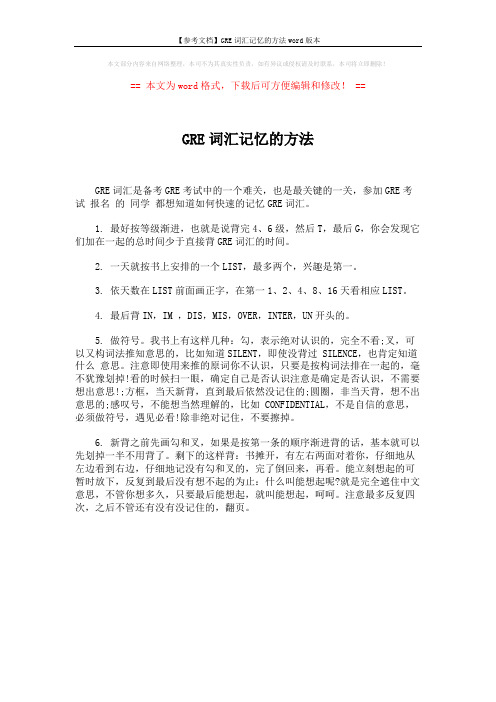
【参考文档】GRE词汇记忆的方法word版本本文部分内容来自网络整理,本司不为其真实性负责,如有异议或侵权请及时联系,本司将立即删除!== 本文为word格式,下载后可方便编辑和修改! ==GRE词汇记忆的方法GRE词汇是备考GRE考试中的一个难关,也是最关键的一关,参加GRE考试报名的同学都想知道如何快速的记忆GRE词汇。
1. 最好按等级渐进,也就是说背完4、6级,然后T,最后G,你会发现它们加在一起的总时间少于直接背GRE词汇的时间。
2. 一天就按书上安排的一个LIST,最多两个,兴趣是第一。
3. 依天数在LIST前面画正字,在第一1、2、4、8、16天看相应LIST。
4. 最后背IN,IM ,DIS,MIS,OVER,INTER,UN开头的。
5. 做符号。
我书上有这样几种:勾,表示绝对认识的,完全不看;叉,可以又构词法推知意思的,比如知道SILENT,即使没背过 SILENCE,也肯定知道什么意思。
注意即使用来推的原词你不认识,只要是按构词法排在一起的,毫不犹豫划掉!看的时候扫一眼,确定自己是否认识注意是确定是否认识,不需要想出意思!;方框,当天新背,直到最后依然没记住的;圆圈,非当天背,想不出意思的;感叹号,不能想当然理解的,比如 CONFIDENTIAL,不是自信的意思,必须做符号,遇见必看!除非绝对记住,不要擦掉。
6. 新背之前先画勾和叉,如果是按第一条的顺序渐进背的话,基本就可以先划掉一半不用背了。
剩下的这样背:书摊开,有左右两面对着你,仔细地从左边看到右边,仔细地记没有勾和叉的,完了倒回来,再看。
能立刻想起的可暂时放下,反复到最后没有想不起的为止:什么叫能想起呢?就是完全遮住中文意思,不管你想多久,只要最后能想起,就叫能想起,呵呵。
注意最多反复四次,之后不管还有没有没记住的,翻页。
背GRE词汇用词根词缀法

据统计,约30%的词汇能用英语本身固有的偏旁部首(词根、词缀)以形释义,当然GRE词汇也不例外,面对如此之难之长的单词,利用词根词缀法记单词不失是一个明智的选择。
因为利用词根、词缀对GRE单词进行构词分析和解形释义,单词既好认又好记,词义一目了然。
那么我们就具体来看一下背GRE词汇用词根词缀法的具体内容吧。
词根词缀记忆法是背任何单词,无论是四六级单词还是托福GRE单词最基本也最有效的记忆方法,必须要掌握。
举GRE中最长也最臭名昭著的一个单词为例:arteriosclerosis。
这个词让无数人沮丧,但了解了词根,无非是arterio+sclero+sis,即动脉、硬化症,这样就能达到过目不忘的效果。
另外,词根词缀记忆法,也会让你在记忆单词的过程中达到事半功倍的效果。
考生可以把具有相同词根的单词放在一起记忆,这样就可以记住一大批单词了。
例如-ivorous(食…的),carnivorous(食肉的;肉食性的), herbivorous(食草的), omnivorous(杂食的),本来一个都记不住,放在一起,一目了然。
而且以后记carnage(大屠杀;残杀;大量绝灭), carnalism(纵欲主义;寻欢作乐), herbaceous(草本的;绿色的;叶状的), omnicompetent(有全权的), omnificent(创造万物的;有无限创造力的), omnipotent(无所不能的;全能的;有无限权力的)等,更是不费吹灰之力。
还有很多这样的例子,例如:claim-叫喊,declaim高谈阔论;disclaim否认;proclaim声明;exclaim 大喊; acclaim欢呼、称赞;claim要求、声称;acclaimed受欢呼的、受称赞的;reclaim 要求归还、矫正、开垦。
上面列举的例子是不是一下子都记住了,背GRE单词用词根词缀法肯定会让你的记忆效率大大提高的,赶紧来尝试吧,希望大家的GRE词汇量都能快速增长。
3种记忆GRE词汇需要的诀窍
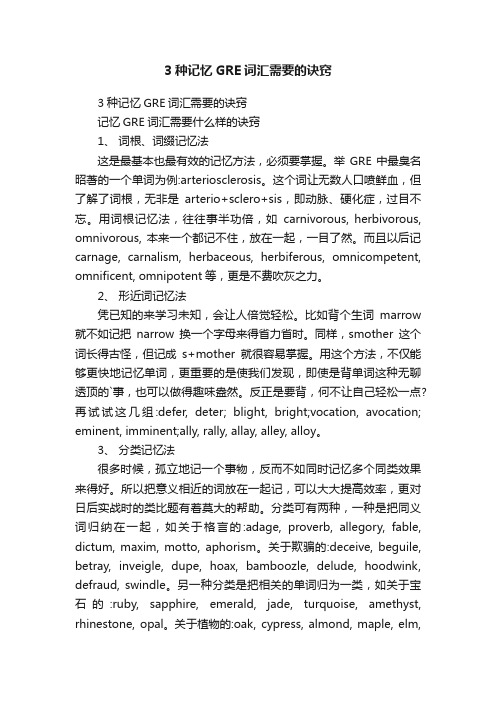
3种记忆GRE词汇需要的诀窍3种记忆GRE词汇需要的诀窍记忆GRE词汇需要什么样的诀窍1、词根、词缀记忆法这是最基本也最有效的记忆方法,必须要掌握。
举GRE中最臭名昭著的一个单词为例:arteriosclerosis。
这个词让无数人口喷鲜血,但了解了词根,无非是arterio+sclero+sis,即动脉、硬化症,过目不忘。
用词根记忆法,往往事半功倍,如carnivorous, herbivorous, omnivorous, 本来一个都记不住,放在一起,一目了然。
而且以后记carnage, carnalism, herbaceous, herbiferous, omnicompetent, omnificent, omnipotent等,更是不费吹灰之力。
2、形近词记忆法凭已知的来学习未知,会让人倍觉轻松。
比如背个生词marrow 就不如记把narrow换一个字母来得省力省时。
同样,smother这个词长得古怪,但记成s+mother就很容易掌握。
用这个方法,不仅能够更快地记忆单词,更重要的是使我们发现,即使是背单词这种无聊透顶的`事,也可以做得趣味盎然。
反正是要背,何不让自己轻松一点?再试试这几组:defer, deter; blight, bright;vocation, avocation; eminent, imminent;ally, rally, allay, alley, alloy。
3、分类记忆法很多时候,孤立地记一个事物,反而不如同时记忆多个同类效果来得好。
所以把意义相近的词放在一起记,可以大大提高效率,更对日后实战时的类比题有着莫大的帮助。
分类可有两种,一种是把同义词归纳在一起,如关于格言的:adage, proverb, allegory, fable, dictum, maxim, motto, aphorism。
关于欺骗的:deceive, beguile, betray, inveigle, dupe, hoax, bamboozle, delude, hoodwink, defraud, swindle。
教你快速记忆GRE词汇解析
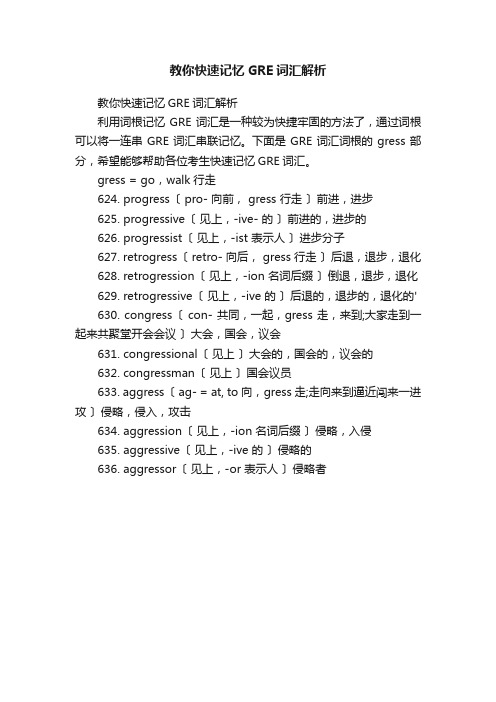
教你快速记忆GRE词汇解析
教你快速记忆GRE词汇解析
利用词根记忆GRE词汇是一种较为快捷牢固的方法了,通过词根可以将一连串GRE词汇串联记忆。
下面是GRE词汇词根的gress部分,希望能够帮助各位考生快速记忆GRE词汇。
gress = go,walk行走
624. progress〔 pro- 向前, gress 行走〕前进,进步
625. progressive〔见上,-ive- 的〕前进的,进步的
626. progressist〔见上,-ist 表示人〕进步分子
627. retrogress〔 retro- 向后, gress 行走〕后退,退步,退化628. retrogression〔见上,-ion 名词后缀〕倒退,退步,退化629. retrogressive〔见上,-ive 的〕后退的,退步的,退化的' 630. congress〔 con- 共同,一起,gress 走,来到;大家走到一起来共聚堂开会会议〕大会,国会,议会
631. congressional〔见上〕大会的,国会的,议会的
632. congressman〔见上〕国会议员
633. aggress〔 ag- = at, to 向,gress 走;走向来到逼近闯来一进攻〕侵略,侵入,攻击
634. aggression〔见上,-ion 名词后缀〕侵略,入侵
635. aggressive〔见上,-ive 的〕侵略的
636. aggressor〔见上,-or 表示人〕侵略者。
【精品文档】利用gre词根记忆词汇-word范文 (1页)
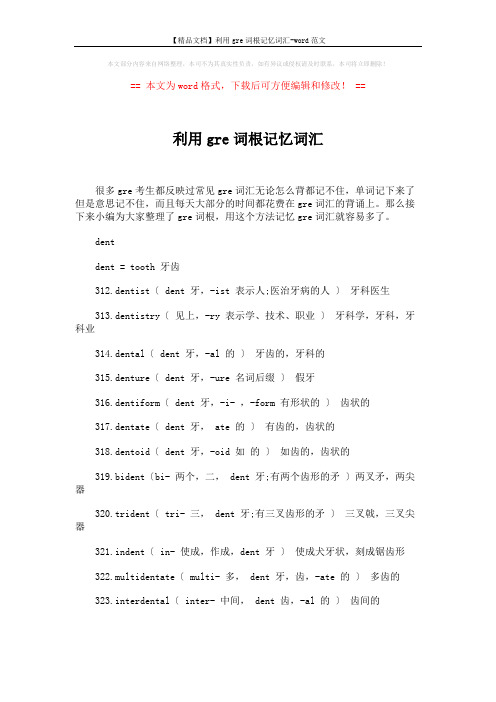
【精品文档】利用gre词根记忆词汇-word范文
本文部分内容来自网络整理,本司不为其真实性负责,如有异议或侵权请及时联系,本司将立即删除!
== 本文为word格式,下载后可方便编辑和修改! ==
利用gre词根记忆词汇
很多gre考生都反映过常见gre词汇无论怎么背都记不住,单词记下来了但是意思记不住,而且每天大部分的时间都花费在gre词汇的背诵上。
那么接下来小编为大家整理了gre词根,用这个方法记忆gre词汇就容易多了。
dent
dent = tooth 牙齿
312.dentist〔 dent 牙,-ist 表示人;医治牙病的人〕牙科医生
313.dentistry〔见上,-ry 表示学、技术、职业〕牙科学,牙科,牙科业
314.dental〔 dent 牙,-al 的〕牙齿的,牙科的
315.denture〔 dent 牙,-ure 名词后缀〕假牙
316.dentiform〔 dent 牙,-i- ,-form 有形状的〕齿状的
317.dentate〔 dent 牙, ate 的〕有齿的,齿状的
318.dentoid〔 dent 牙,-oid 如的〕如齿的,齿状的
319.bident〔bi- 两个,二, dent 牙;有两个齿形的矛〕两叉矛,两尖器
320.trident〔 tri- 三, dent 牙;有三叉齿形的矛〕三叉戟,三叉尖器
321.indent〔 in- 使成,作成,dent 牙〕使成犬牙状,刻成锯齿形
322.multidentate〔 multi- 多, dent 牙,齿,-ate 的〕多齿的
323.interdental〔 inter- 中间, dent 齿,-al 的〕齿间的。
【推荐下载】最快最有效的GRE词汇背诵方法-word范文模板 (1页)
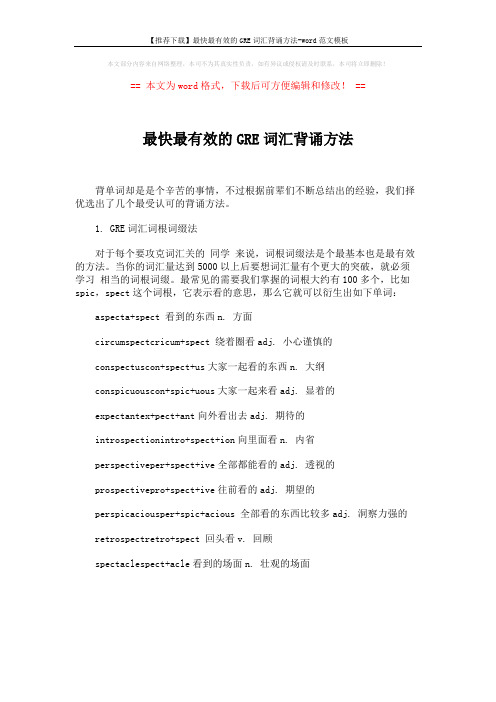
【推荐下载】最快最有效的GRE词汇背诵方法-word范文模板
本文部分内容来自网络整理,本司不为其真实性负责,如有异议或侵权请及时联系,本司将立即删除!
== 本文为word格式,下载后可方便编辑和修改! ==
最快最有效的GRE词汇背诵方法
背单词却是是个辛苦的事情,不过根据前辈们不断总结出的经验,我们择优选出了几个最受认可的背诵方法。
1. GRE词汇词根词缀法
对于每个要攻克词汇关的同学来说,词根词缀法是个最基本也是最有效的方法。
当你的词汇量达到5000以上后要想词汇量有个更大的突破,就必须学习相当的词根词缀。
最常见的需要我们掌握的词根大约有100多个,比如spic,spect这个词根,它表示看的意思,那么它就可以衍生出如下单词:
aspecta+spect 看到的东西n. 方面
circumspectcricum+spect 绕着圈看adj. 小心谨慎的
conspectuscon+spect+us大家一起看的东西n. 大纲
conspicuouscon+spic+uous大家一起来看adj. 显着的
expectantex+pect+ant向外看出去adj. 期待的
introspectionintro+spect+ion向里面看n. 内省
perspectiveper+spect+ive全部都能看的adj. 透视的
prospectivepro+spect+ive往前看的adj. 期望的
perspicaciousper+spic+acious 全部看的东西比较多adj. 洞察力强的retrospectretro+spect 回头看v. 回顾
spectaclespect+acle看到的场面n. 壮观的场面。
GRE词汇如何记忆
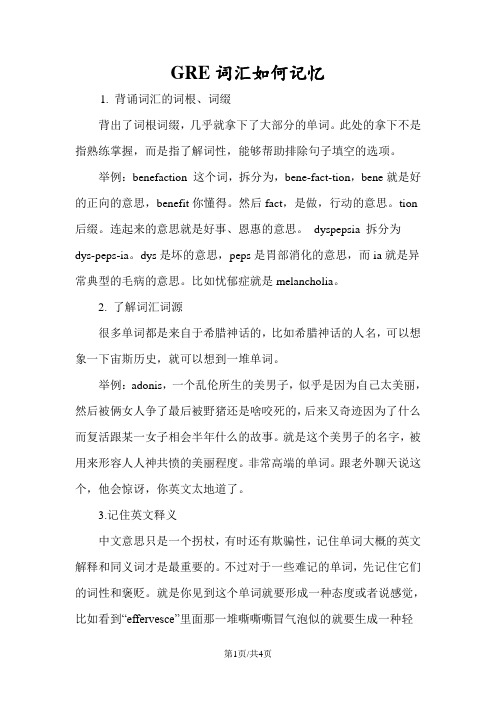
GRE词汇如何记忆1. 背诵词汇的词根、词缀背出了词根词缀,几乎就拿下了大部分的单词。
此处的拿下不是指熟练掌握,而是指了解词性,能够帮助排除句子填空的选项。
举例:benefaction 这个词,拆分为,bene-fact-tion,bene就是好的正向的意思,benefit你懂得。
然后fact,是做,行动的意思。
tion 后缀。
连起来的意思就是好事、恩惠的意思。
dyspepsia 拆分为dys-peps-ia。
dys是坏的意思,peps是胃部消化的意思,而ia就是异常典型的毛病的意思。
比如忧郁症就是melancholia。
2. 了解词汇词源很多单词都是来自于希腊神话的,比如希腊神话的人名,可以想象一下宙斯历史,就可以想到一堆单词。
举例:adonis,一个乱伦所生的美男子,似乎是因为自己太美丽,然后被俩女人争了最后被野猪还是啥咬死的,后来又奇迹因为了什么而复活跟某一女子相会半年什么的故事。
就是这个美男子的名字,被用来形容人人神共愤的美丽程度。
非常高端的单词。
跟老外聊天说这个,他会惊讶,你英文太地道了。
3.记住英文释义中文意思只是一个拐杖,有时还有欺骗性,记住单词大概的英文解释和同义词才是最重要的。
不过对于一些难记的单词,先记住它们的词性和褒贬。
就是你见到这个单词就要形成一种态度或者说感觉,比如看到“effervesce”里面那一堆嘶嘶嘶冒气泡似的就要生成一种轻盈高兴的感觉,知道它是个好词儿,看到effluvium你看到那一堆u 啊v啊就会产生一种不适感很恶心。
4.重视近义词一定要重视近义词,你不背英文释义被近义词当释义都可以。
这样越往后背越轻松,就像滚雪球一样。
比如背到demanding,知道它有“事儿多要求多很麻烦”这么个意思,而且这个意思你很可能之前就知道,demanding是个很初阶的词汇啦,然后你就用这个demanding 滚到exacting,诶,还OK,再滚到grueling,用demanding和exacting 去解释grueling,不错,再往后滚出laborious和onerous,以至于persnickety、taxing、系列等等都可以这么滚。
GRE词汇的词根记忆法介绍

GRE词汇的词根记忆法介绍
英语单词一般平均有三个左右的派生词,如果我们记住了一个常用单词,就可以通过发散记忆记住3—4个英语单词,从而提高记忆效率。
例如我们记住了词根act,就会很容易联想起action、active、actor、actress、activity等词。
除了词根以外,英语单词当中还有很多词缀(包括前缀,后缀),这些前缀和后缀在单词当中出现得非常频繁。
记住了这些单词的前缀和后缀再加上词根的帮助,记忆单词就不是一件无序的事情。
如:前缀im、un、dis表示否定;后缀er、or、ian、ist等表示人等等。
这种记忆方法可以充分利用单词之间的形式和意义联系,对大量的词汇进行模糊记忆(只要知道某个单词中包含有某个认识的词根或词缀,就可以知道该词的大致意义或词*),从而大大提高阅读理解能力。
相应地,在做词汇题或阅读理解中的上下文词义猜测时,也能根据词根、词缀做出正确的判断。
在gre词汇的背诵中,掌握了这种词根记忆法就可以同时背出一连串的单词。
确实大大提升了速度,而且记忆得非常巩固。
考生在背诵长难词汇的时候不妨用一下这种方法。
gre词汇巧记

gre词汇巧记一、大浪淘沙如果你的目标是一天记住100个单词,那么所需背诵的单词数量最好要达到500个。
因为人的记忆力是有限的,所以不要指望只背20个单词,就能记住全部并且永远不会忘记。
将每天背诵的数量定在500个,虽然你实际记住的也许只有100个,但是这100个一定是你记得最牢的。
把没有记住的单词继续放到第二天的计划中,这样天天坚持,就会看到成效。
这个方法好比用筛子过滤沙砾,虽然漏掉的是大多数,但剩下的却是精华。
要在短时间内背出大量的单词,必须“以量取胜”,持之以恒。
二、词根词缀这个方法基于英语单词的构词法,靠分解单词来记忆。
每个英语单词都可以分解成一个核心词根,和前缀或后缀。
例如在view(看法、景色)这个单词的基础上,加上表示“再一次”的前缀re,就是“复习”的意思;加上表示“人物”的后缀er,就有“观众、探视器”等的意思。
这是一种比较高效率的记忆方法,认识一个词缀就会帮助你认识很多单词,做到举一反三、但前提是,你必须先学习和掌握一定的词根、词缀的意义。
三、循环往复把所要背的单词分组,比如每组100个,共50组。
第一天,背第一组的100个;第二天不要急着前行,先用比前一天快一倍的速度把第一组的单词过一遍,然后再看第二组的单词;几天以后再复习第一天的单词,以此类推。
这样做虽然可能影响背单词的进度,但能有效地巩固所学的内容,以“滚雪球”的方式加深记忆。
人会遗忘,最好的方法是在你正要遗忘的时候复习一下,这相当于对原来记忆进行刺激,会使快要忘记的东西记得很牢。
这个方法因人而异,你可以根据自己的记忆力情况,决定复习的周期。
如果怕雪球越滚越大,到后来每天的任务越来越艰巨,你也可以先把要背的所有单词都背一遍,采取每第二天只复习前一天的内容方法,等全部背完一遍后再从头来第二遍。
四、狂读狂写这是依靠重复其中一种生理活动来强迫大脑认知的方法,对于大多数人来说是有效的。
当然每个人的习惯各有不同,有的喜好大声朗读所背单词,有的钟爱在白纸上边背边写所需记忆的单词,更有甚者把单词录成卡带,每日听之方可入眠。
GRE词汇记忆的完整攻略
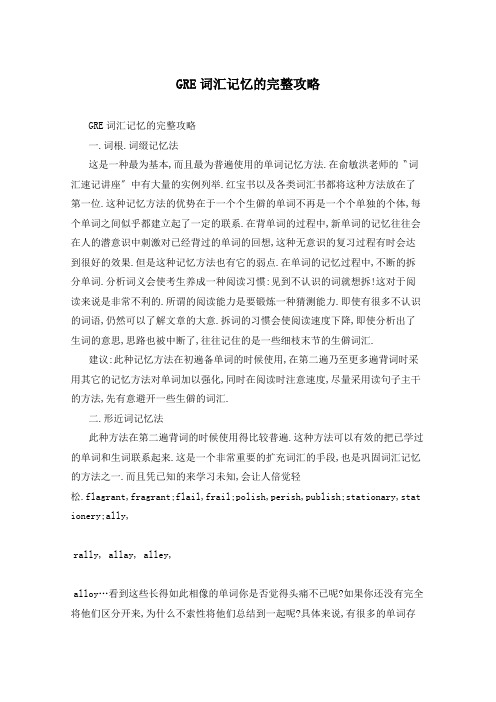
GRE词汇记忆的完整攻略GRE词汇记忆的完整攻略一.词根.词缀记忆法这是一种最为基本,而且最为普遍使用的单词记忆方法.在俞敏洪老师的〝词汇速记讲座〞中有大量的实例列举.红宝书以及各类词汇书都将这种方法放在了第一位.这种记忆方法的优势在于一个个生僻的单词不再是一个个单独的个体,每个单词之间似乎都建立起了一定的联系.在背单词的过程中,新单词的记忆往往会在人的潜意识中刺激对已经背过的单词的回想,这种无意识的复习过程有时会达到很好的效果.但是这种记忆方法也有它的弱点.在单词的记忆过程中,不断的拆分单词.分析词义会使考生养成一种阅读习惯:见到不认识的词就想拆!这对于阅读来说是非常不利的.所谓的阅读能力是要锻炼一种猜测能力.即使有很多不认识的词语,仍然可以了解文章的大意.拆词的习惯会使阅读速度下降,即使分析出了生词的意思,思路也被中断了,往往记住的是一些细枝末节的生僻词汇.建议:此种记忆方法在初遍备单词的时候使用,在第二遍乃至更多遍背词时采用其它的记忆方法对单词加以强化,同时在阅读时注意速度,尽量采用读句子主干的方法,先有意避开一些生僻的词汇.二.形近词记忆法此种方法在第二遍背词的时候使用得比较普遍.这种方法可以有效的把已学过的单词和生词联系起来.这是一个非常重要的扩充词汇的手段,也是巩固词汇记忆的方法之一.而且凭已知的来学习未知,会让人倍觉轻松.flagrant,fragrant;flail,frail;polish,perish,publish;stationary,stat ionery;ally,rally, allay, alley,alloy…看到这些长得如此相像的单词你是否觉得头痛不已呢?如果你还没有完全将他们区分开来,为什么不索性将他们总结到一起呢?具体来说,有很多的单词存在着拼写上的近似(毕竟英文只有26个字母),这样就很容易产生混淆,而我们恰恰可以将这些词汇放在一起,从而把他们真正记住并区分开.在网上记录了很多形近的单词,每一份总结都不尽相同,细想起来,这正是此类记忆方法的特点.每个人在背单词的过程中都可以总结出一套适合自己的方法,当背到某一个单词的时候产生了另一个单词的联想,就马上把它们记录下来,日积月累就是一份完整的形近词的整理笔记.GRE词汇备考的心得背单词的意义:我记得在版里面有一个关于背单词在备考GRE过程中所占比重的投票,当时我投的是50%以上,相当大一部分的版友也都认为背单词起码应该占到一半的比例甚至更多.我们理所当然应该能认识到背单词的重要意义,如果单词不过关,那么你的整个备考过程注定将会是不成功的.GRE考试为什么难,往往就是因为我们不认识单词,毋庸置疑,这个考试绝对是考察个人能力的考试,你想靠蒙来蒙混过关是不可能的事情.所以说,要想在这个考试上拿高分成为人神参拜的大牛,考试词汇就必须烂熟于心(当然并不是说考试卷上的所有的单词都必须认识,毕竟有些词我们没有必要知道它的确切意思,后面会具体说到).工具书的选择:这个问题已经是老生常谈了,前辈们基本上都做过了很好的总结,我在这儿在稍微简单地再啰嗦一小下下吧:1.红宝书想都不用想,本书是一个Gter所必备的攻略.诚然ETS并不是按照本书来出题,但是经过这么多年的检验证明:红宝书的确是我们走向资本主义国度最有利的武器之一!2.逆序小词典(也就是所谓的〝红宝伴侣〞)很精巧的一本书,主要是用在红宝书看过几遍,对里面的单词有一定程度的熟悉之后.反复用红宝书背单词毕竟会出现疲惫心理以及单词的位置记忆效应,这时候就需要用红宝伴侣来进行调整.正着背,反着背,我就不信收拾不了你,小样儿...3.蓝宝书后期复习类比反义的时候会用到的一本书,词汇量上比红宝少很多,可以适当参考.我备考的时候只用了这三本书,事实上是这三本都买了,但是主要看了前两本,第三本基本没怎么翻过(或许对我的备考有一定影响,谁知道呢,考完了也不管了).剩下的书大致就是黑宝书,绿宝书,巅峰词汇,思马得等等,我没用过,没有发言权,大家自己斟酌.个人建议是有上面的三本就足够了.背单词的方法:背单词的意义无非就是那么些大话,对GRE稍微有点儿了解的都知道;工具书也就那么几本,挑上几本甚至是一本(那必须是红宝)掌握好就行了.关键是在于你背单词的方法,这个才是背单词过程中最为基本也最为重要的东西,也算是本篇的主要目的所在吧!首先,你要认清楚那些单词需要背,那些单词根本不用背.具体来说,主考词也就是类比反义和填空中会考到的词那是必须要掌握的,而那些在阅读中可能会出现的单词,尤其是有些名词(不是全部)根本没必要浪费时间去记忆,比如下面两个词:antihistamine(抗组胺剂)和asparagus(芦笋),这种词本来考的可能性比较小,至少不可能作为.单词来考,就算在阅读理解中出现,我们完全可以以A,B或者首字母缩写来代替.看过长难句的人一定知道这个词plankton(浮游生物),我们在快速阅读的时候碰到这么个词,完全可以以P来代替之,基本上是不会影响我们理解文章的,反正就是某个东西嘛,对不?然后,就是涉及到一些具体的操作方法了.我比较欣赏的是_DF的丽丽老师(号称_DF的词汇王),她的口诀法真的是很不错的方法(我在前期背单词的过程中听了她的词汇8000和GRE的录音,我记得版里面有这个的下载的).附件会给出我以前听录音的时候总结的一些口诀的下载.再就是同义词和易混词的比较记忆.同义词其实就是类似于孔乙己老先生所说的茴香豆的〝茴〞字的四种写法,一来GRE的词汇量非常大,因而不可避免的出现了很多具有相同意思的单词,这样的总结势必有利于我们的记忆;再者来说这样的总结也有利于避免大家在后期准备作文的时候出现词汇贫乏的现象,比如想要表达〝贫穷〞脑子里面的第一反应就是poor,然后就没词了,通过同义词的整理,我们就知道可以用indigent,impecunious等词来替换.丽丽老师在讲课的时候也提到过她独创的口诀法的来源,有很多都是来源于逆序的排列,而我所说的易混词有很大一部分也是来源于逆序,具体见附件.当然这只是我的小总结,大家在自己背单词的过程中可以根据自己的情况总结自己所认为的易混词,毕竟各人对不同单词的敏感程度不一样,对我来说很难记的一个词对你来说可能就是小case(有时候甚至说没有原因,没有记忆方法,但是你就是认识这个词).附件给出了我在备考时候自己整理的部分同义易混词,整理的不全,凑合看吧.说明一下:同义词以及易混词是纯粹背单词书的时候总结的;同义词.意群总结意群总结是后期准备类比反义的时候总结的(里面涉及部分类反的难题,可以先不看).杨鹏的_天搞定GRE单词里面有一个混词表大家也可以拿来参考记忆,很不错的.提到背单词的方法,第一反应居然没有想到杨鹏的_天搞定GRE单词.关于这个方法,大家仁者见仁,智者见智,都有不同的看法,我就不多说了,觉得合适就用,不合适的话自己稍微做下调整改下周期也是可以的.不过要提醒大家,该方法是很痛苦的(慎用),当然也不否认有牛人按此方法10天就搞定红宝书一遍.这个总结也是总结的很全的一个分类词汇,有时间的话可以研究研究,没时间还是老老实实看红宝书去!有些版友会在暑期的时候上_DF,希望你们最好能在上_DF之前能够完成我上面所说的这些,最起码要完成红宝一遍吧,毕竟你们现在应该不是第一天开始备考(如果是的话,那么哥们儿你得抓点儿紧了有些可以在上_DF之间穿插完成,虽然上_DF课程也很紧张,但是准备GRE需要我们付出大量的时间和努力.当然,我所说的这些都是在备考的前期所需要做的工作,也就是只停留在纯粹背单词的过程中的一些观点.但是作为GRE考试来说,单词的掌握还是需要你在后期的反复做真题的过程中来完成的.GRE词根词汇背诵gradgrad = step,go,grade 步,走,级572.gradual 〔 grad 步,-ual 形容词后缀,…的〕逐步的,逐渐的573.retrograde 〔 retro- 向后,grad 步,行走;〝向后走〞〕→后退,退步,逆行574.retrogradation 〔见上,-ation 名词后缀〕后退,退步,逆行575.graduate 〔 grad 步,级,-u- ,-ate 动词后缀;〝在学业上走完某一步〞,〝在学业上完成某一级〞→ 〕毕业; 〔转为〕毕业生576.graduation 〔见上,-ation 名词后缀〕毕业577.undergraduate 〔 under- 低于,不够,不到,不足, graduate 毕业生〕尚未毕业者,大学肄业生578.postgraduate 〔 post- 后,在…之后,见上〕大学毕业后的;研究生579.degrade〔 de- 下,向下,grad 步,走,级;〝往下走〞,〝降级〞〕下降,堕落,退化,使降级,贬默580.degradation 〔见上,-ation 名词后缀〕堕落,退化,降级,贬黜581.grade 等级,年级,级别,阶段,程度582.gradation 〔见上,-ation 名词后缀〕等级,分等,分级583.upgrade 〔 up 上,grad 步,级〕上升,升级,提升,上坡584.downgrade 〔 down 下,grad 步,级〕降低,贬低,降级,下坡585.gradine〔 grad 步,级→阶梯,-ine 名词后缀〕阶梯的一级,阶梯座位的一排GRE词根词汇背诵gramgram = write ,something written or drawn 写,画,文字,图形586.grammar〔 gram 写,文字,m 重复字母,-ar 名词后缀;关于〝文字〞的法则→ 〕语法,文法587.grammarian〔见上,-ian 名词后缀,表示人〕语法学家,文法家588.grammatical〔见上,-atical 形容词后缀,…的〕语法的,属于语法上的 589.diagram〔 dia- 对穿,gram 画;〝上下左右对穿画线〞→ 〕图解,图表 590.diagrammatic〔见上,-atic …的〕图表的,图解的591.telegram〔 tele 远, gram 写,文字;〝从远方通过电波传来的文字〞→ 〕电报592.program〔 pro- 在前面, gram 写→书,表,单;〝写在前面的说明文字〞→ 〕节目单,戏单,说明书,大纲,方案593.cryptogram〔 crypto 隐,秘密,gram 写,文字〕密码,密码文,暗记594.parallelogram〔 parallel 平行的, gram 图形;〝对边平行的图形〞→ 〕平行四边形595.gram〔 gram 写→刻写;在重量计上所〝刻写〞的一个符号→重量单位〕克(国际重量单位)596.kilogram〔 kilo- 千,gram 克〕千克,公斤597.gramophone〔 gram 写→记录,-o-, phon 声音;〝记录声音〞的仪器→〕留声机598.phonogram〔 phon 声音,-o-, gram 文字〕音标文字,表音符号;唱片,录音片599.hologram〔 holo 全,gram 画,图形〕全息图600.seismogram〔 seismo 地震, gram 画,图形〕地震图6_.electrocard-iogram〔 electro 电, cardi 心,-o-,gram 图〕心电图GRE填空全面解析SE3大出题套路 GRE填空等价不止考同义词 ,名师全面解析SE3大出题套路,下面小编就和大家分享,来欣赏GRE背单词记不住怎么办 GRE背单词记不住怎么办?请从记忆态度和方法上找原因,下面小编就和大家分享,来欣赏一agreatdeal和agreatmany的区别 a great deal 和 a great many的区别,你值得拥有!今天小编给大家带来了a great dealGRE词汇之常见词根词缀整合小编给大家带来了GRE词汇之常见词根词缀,一起来学习学习吧,下面小编就和大家分享,。
关于实用GRE词汇的记忆方法
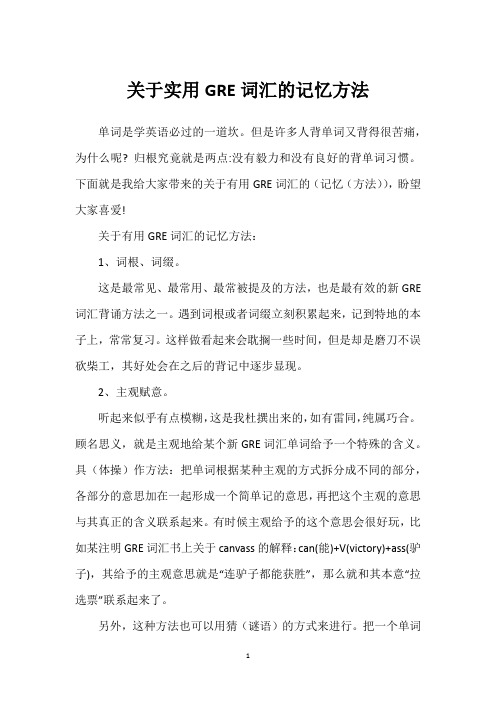
关于实用GRE词汇的记忆方法单词是学英语必过的一道坎。
但是许多人背单词又背得很苦痛,为什么呢? 归根究竟就是两点:没有毅力和没有良好的背单词习惯。
下面就是我给大家带来的关于有用GRE词汇的(记忆(方法)),盼望大家喜爱!关于有用GRE词汇的记忆方法:1、词根、词缀。
这是最常见、最常用、最常被提及的方法,也是最有效的新GRE 词汇背诵方法之一。
遇到词根或者词缀立刻积累起来,记到特地的本子上,常常复习。
这样做看起来会耽搁一些时间,但是却是磨刀不误砍柴工,其好处会在之后的背记中逐步显现。
2、主观赋意。
听起来似乎有点模糊,这是我杜撰出来的,如有雷同,纯属巧合。
顾名思义,就是主观地给某个新GRE词汇单词给予一个特殊的含义。
具(体操)作方法:把单词根据某种主观的方式拆分成不同的部分,各部分的意思加在一起形成一个简单记的意思,再把这个主观的意思与其真正的含义联系起来。
有时候主观给予的这个意思会很好玩,比如某注明GRE词汇书上关于canvass的解释:can(能)+V(victory)+ass(驴子),其给予的主观意思就是“连驴子都能获胜”,那么就和其本意“拉选票”联系起来了。
另外,这种方法也可以用猜(谜语)的方式来进行。
把一个单词的主观含义写在一个本子上,然后试着去写出这个单词以及其真正的含义。
这些都是比较有意思的方法。
3、自由组合有些新GRE词汇看着就难过,那么就给它配一个比较舒适的单元一起背;假如某个单元太长,那么就给它配一个相对比较短的单元一起背;可以从中间某个单元开头背,也可以从某个单元的中间开头,不肯定要根据从前到后或者从后向前的挨次背。
4、分类和联想记忆分类记忆不是根据各个领域的内容来进行分类,当然这也是一种方法,我的意思是根据你所设定的某个标准来对新GRE词汇进行归类。
比如,你可以根据金木水火土的方式来归类,根据春夏秋冬的方式来归类,根据动物、植物、人物、微生物等等进行归类。
联想记忆是指,背到某个单词的时候,可以进行(发散思维)的训练。
GRE词汇快速记忆3个小技巧分享
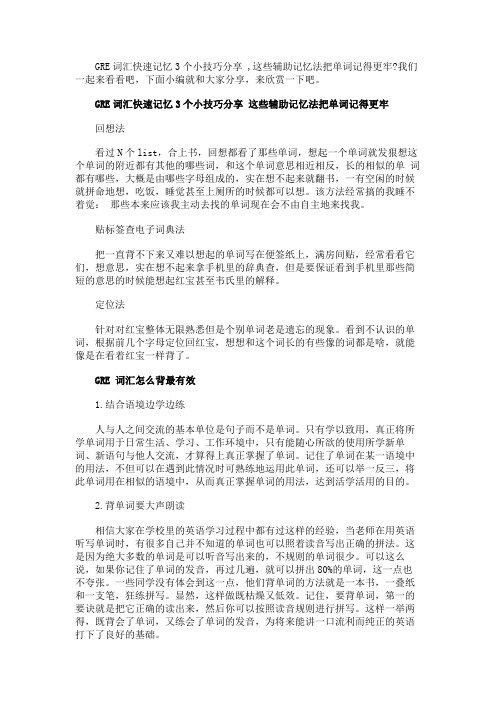
GRE词汇快速记忆3个小技巧分享 ,这些辅助记忆法把单词记得更牢?我们一起来看看吧,下面小编就和大家分享,来欣赏一下吧。
GRE词汇快速记忆3个小技巧分享这些辅助记忆法把单词记得更牢回想法看过N个list,合上书,回想都看了那些单词,想起一个单词就发狠想这个单词的附近都有其他的哪些词,和这个单词意思相近相反,长的相似的单词都有哪些,大概是由哪些字母组成的,实在想不起来就翻书,一有空闲的时候就拼命地想,吃饭,睡觉甚至上厕所的时候都可以想。
该方法经常搞的我睡不着觉:那些本来应该我主动去找的单词现在会不由自主地来找我。
贴标签查电子词典法把一直背不下来又难以想起的单词写在便签纸上,满房间贴,经常看看它们,想意思,实在想不起来拿手机里的辞典查,但是要保证看到手机里那些简短的意思的时候能想起红宝甚至韦氏里的解释。
定位法针对对红宝整体无限熟悉但是个别单词老是遗忘的现象。
看到不认识的单词,根据前几个字母定位回红宝,想想和这个词长的有些像的词都是啥,就能像是在看着红宝一样背了。
GRE 词汇怎么背最有效1.结合语境边学边练人与人之间交流的基本单位是句子而不是单词。
只有学以致用,真正将所学单词用于日常生活、学习、工作环境中,只有能随心所欲的使用所学新单词、新语句与他人交流,才算得上真正掌握了单词。
记住了单词在某一语境中的用法,不但可以在遇到此情况时可熟练地运用此单词,还可以举一反三,将此单词用在相似的语境中,从而真正掌握单词的用法,达到活学活用的目的。
2.背单词要大声朗读相信大家在学校里的英语学习过程中都有过这样的经验,当老师在用英语听写单词时,有很多自己并不知道的单词也可以照着读音写出正确的拼法。
这是因为绝大多数的单词是可以听音写出来的,不规则的单词很少。
可以这么说,如果你记住了单词的发音,再过几遍,就可以拼出80%的单词,这一点也不夸张。
一些同学没有体会到这一点,他们背单词的方法就是一本书,一叠纸和一支笔,狂练拼写。
- 1、下载文档前请自行甄别文档内容的完整性,平台不提供额外的编辑、内容补充、找答案等附加服务。
- 2、"仅部分预览"的文档,不可在线预览部分如存在完整性等问题,可反馈申请退款(可完整预览的文档不适用该条件!)。
- 3、如文档侵犯您的权益,请联系客服反馈,我们会尽快为您处理(人工客服工作时间:9:00-18:30)。
【优质】利用词根记忆快速记忆GRE词汇-优秀word范文
本文部分内容来自网络整理,本司不为其真实性负责,如有异议或侵权请及时联系,本司将立即删除!
== 本文为word格式,下载后可方便编辑和修改! ==
利用词根记忆快速记忆GRE词汇
利用词根记忆GRE词汇是一种较为快捷牢固的方法了,通过词根可以将一连串GRE词汇串联记忆。
下面是GRE词汇词根的habit部分,希望能够帮助各位考生快速记忆GRE词汇。
habit
habit = dwell 居住
645. habitable〔 habit 居住,-able 可的〕可居住的
646. habitant〔 habit 居住,-ant 表示人〕居住者
647. habitation〔 habit 居住,-ation 名词后缀]居住
648. inhabit〔 in- 表示in , habit 居住〕居住于,栖居于
649. inhabitable〔见上,-able 可的〕可居住的,可栖居的
650. inhabitancy〔见上,-ancy 表示情况、状态〕居住,有人居住的状态
651. inhabitant〔见上,-ant 表示人〕居民,住户,常住居民
652. inhabitation〔见上,-ation 名词后缀〕居住,栖居
653. cohabit〔 co- 共同,habit 居住〕同居,饼居
654. cohabitant〔见上,-ant 表示人〕同居者
655. cohabitatioll〔见上,-ation 名词后缀〕同居
希望以上GRE词汇的词根记忆方法能够使各位考生快速记忆GRE词汇。
不过,天下没有太容易的捷径,只有将方法运用得宜,才能达到预期的目标。
唯有水到才可渠成。
